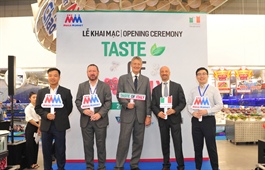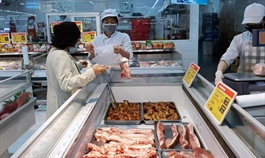Agricultural sector urged to enhance use of by-products
Agricultural sector urged to enhance use of by-products
A large quantity of agricultural by-products is produced every year, but a majority of it is treated as waste and dumped or burned.

If exploited well the by-products would not only bring about huge economic efficiency, but also contribute to environmental protection, an international workshop heard in HCM City on September 28.
Nguyen Thi Thanh Thuy, Director of the Department of Science, Technology and Environment, speaking at the ‘Agricultural by-products – renewable resources’ workshop, said agriculture plays a significant role in the country’s economy, and was a pillar of the economy during the COVID-19 pandemic.
But agriculture also generates a large volume of by-products, which, if not properly managed, would cause pollution and be a waste of organic resources, she said.
In 2020 they amounted to more than 156.8 million tonnes, including 88.9 million tonnes from harvests and processing of crops, 61.4 million tons of cattle and poultry manure, 5.5 million tonnes from forestry, and one million tonnes from fisheries, she said.
“From the perspective of a circular agricultural economy associated with green growth, by-products in agriculture, forestry and fisheries must be considered a renewable resource rather than waste, an important input that extends the agricultural value-added chain.”
Nguyen Huu Ninh, deputy director of the Department of Science, Technology and Environment, said only 52 per cent of crop by-products are collected and used.
Rice straw is used as forage for cattle, filler for livestock breeding houses and biological bed for livestock, growing mushroom and others, but almost half is burnt, causing pollution, he said.
“Annual biomass by-products from main crops such as rice, corn, sugarcane, and vegetables can provide an equivalent amount of 43.4 million tonnes of organic fertilisers, 1.86 million tonnes of urea nitrogen, 1.68 million tonnes of single superphosphate, and 2.23 million tonnes of potassium sulfate.
“However, these nutrients are almost completely wasted, and there are no incentive mechanisms for reusing them.”
The cost of treating the by-products is high, leading to their loss, he said.
Referring to livestock by-products, he said only 23 per cent is used to produce organic fertilisers, while the rest goes waste.
The country earned US$275 million from processing fisheries by-products in 2020, but if the nearly one million tonnes are fully exploited using technology, the value would rise to $4-5 billion.”
Assoc Prof Dr Bui Ba Bong, a former deputy agriculture minister, said to promote the use of by-products the Government needs to change policies to dovetail with the circular value chain.
Ninh too said the Government needs to tweak mechanisms and policies to encourage businesses to participate in the processing of agricultural by-products.
Besides having policies to encourage circular agricultural production, the country also needs to improve research and the use of technology in processing by-products, he said.
Besides, it is necessary to promote communication about by-products, green growth in agriculture and smart agriculture in response to climate change, he added.
Jesus Lavina, deputy head of Cooperation for the EU Delegation to Vietnam, said: "Whereas agriculture is a major contributor to greenhouse gas emissions it also brings significant opportunities to combat climate change, through, for instance, carbon sequestration in healthy soils and providing alternative renewable sources like biogas, agricultural by-products or waste to energy approaches.”
The workshop was organised by the Ministry of Agriculture and Rural Development in collaboration with the Project "Promotion of supply and demand of Eco-Fair Agri-food processing products in Vietnam" funded by the European Union.




















